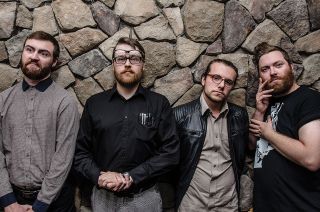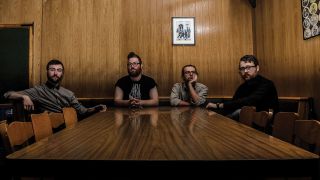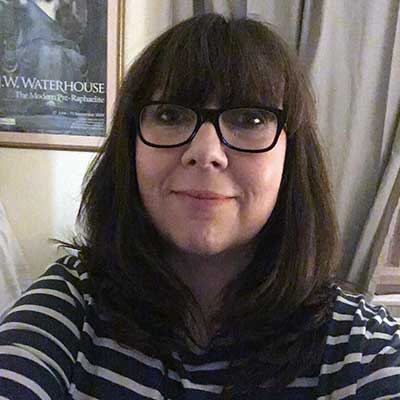Secret radio stations? Atomic disasters? Prog snooker player Steve Davis on a synth? Salford boys Trojan Horse have always been eclectic, but with their third record, Fukushima Surfer Boys, the band have really pushed the thematic boat – or surf board – out. Trouble is, it’s taken three years and the loss of long-time drummer Richard Guy Crawford to get here.
“We were the essence of a touring and recording band,” vocalist/guitarist Nick Duke explains of life after Crawford’s departure over a table in a greasy spoon in Camden Town. “We were everything a band was supposed to be. You get to a point where you’re like, ‘Okay we can carry on doing ‘band’ things indefinitely’, or we can say, ‘We’re supposed to be progressive, doing things that are new, always changing, so what can we do that’s going to change ourselves?’”
With spectacular 2014 psychedelic maelstrom World Turned Upside Down just out of the traps the answer was to head into the studio – Red Eccles, their production hub since forever – and work as a three-piece to quickly prepare a new release. The remaining TH core – the three Duke brothers Nick, Eden (vocals/keys/synths) and Lawrence ‘Loz’ (vocals/bass) – enlisted the percussion skills of their steadfast producer/collaborator Danny The Red, who knew his way around a kit a bit. Duke admits they went in “with nothing”, then the ideas started to flow, inspired by the experimentation of Flying Lotus and Thundercat, the soundtrack to The Wicker Man and a long-standing fascination with weird electronica.
“We went, ‘Let’s change our approach, do something completely different, something abstract.’ And a couple of tracks went that way, starting with UVB-76.”
Ah, UVB-76, aka ‘The Buzzer’. Discovered at some point in the 70s, if you can tune a shortwave radio to 4625 kHz you might stumble across its mysterious, continuous signal that’s allegedly a beacon from the Russian Armed Forces. Originally a repeating two-second pip, in 1990 the broadcast changed to a buzz sound interspersed with short bursts of spoken messages. Duke discovered it after falling down a rabbit hole on Wikipedia and became obsessed with it.
“It’s just bizarre. You tune in and there’ll be someone speaking in Russian, then screaming in the background, then countdowns,” he continues. “Nobody really knows who broadcasts it or what the purpose of it is. Even the location is a bit of a mystery. I came in with this recording, saying, ‘We should do something like this. Let’s take that and write something over the top of it.’”

Work began on this spaced-out oddity, and what would become the midpoint of the album took shape around an off-kilter, non-time-signatured two-minute pulse of a trippy stream-of-consciousness. Duke also brought in “demos of stuff that I was going to do as a weird noise project, then we stripped back the layers and rebuilt it.
“We had an idea of where we wanted to take the record but we didn’t know whether our competency would get us there,” he says. “We thought about Thundercat – a virtuoso and obviously amazing – but we couldn’t compare ourselves, so we went, ‘Don’t think about it, just see what comes out.’ We’ve always had that punk sensibility. We know where the finish is and we steam head in that direction. Whether we’ll get there in one piece or not, who knows?”
Staying in one piece over the course of the project seems to have been problematic, and Duke reveals that the album is more personal and emotional than previous records.
“We’ve all had personal struggles and to deal with shifts in our mental state. It wasn’t a difficult album in the respect of, ‘It’s hard to write a song,’ but it was a difficult album in, ‘I can’t do this anymore.’
“It was tough to motivate ourselves,” he continues. “Working with the music industry now is harder, although we have friends everywhere – people in bands, labels – who are all very supportive of us. It’s just a lot more difficult to get stuff out there and heard. Sometimes you’re smashing your head against a brick wall and you can’t pay thousands of pounds for a PR. You can see what you do has value but other people don’t have time to listen to us.
“So we thought we’d work quickly, but the album took three years,” Duke laughs. “Life got in the way. You start a new job, you’ve got kids… We don’t have the wealth of time we had when we were doing World Turned Upside Down, or [the 2010 debut]. Just doing the album artwork took me a year… and that’s when the album was going to be named after another track, The Ebb.”
A grand, 10-minute glitch-tronic overture for the album, The Ebb was the first track from the sessions to be named, and as the album’s initial title track, symptomatic of what Duke identifies as “the idea I have at the start isn’t what will be there at the end”. Later, the track Fukushima Surfer Boys would be promoted to headline status. “It’s a completely ridiculous title, but it suits the comedic part of us,” he says. “It sounds nice and airy but lyrically it’s about atomic death, it’s horrific – and the language we use is a working man’s poetry. We’re always suggesting more than what we’re saying.”
At the time of the Fukushima… sessions, Duke was studying a music and business degree in Manchester at BIMM – the British and Irish Institute Of Modern Music – which would lead to the Horse’s newest recruit, current drummer Joe Wood.
“I was hosting a BIMM live event, an end-of-term thing,” says Duke, “and I was getting the next act to go onstage when I just heard this phenomenal drumming. It was J Dilla-esque, weird, syncopated and off-time. I put my head round the door to see what this young guy was doing. I’d had these beats in my head and he was already playing that kind of stuff. He’s been in the band for over a year now and the music that’s come out of that, the change our mindset and the way we’re working has all coalesced in a really positive way.”
Drummer sorted, the album spread its strange tentacles, making room for trademark TH tracks such as the psych pronk rocker How You Gonna Get By? and the gurgling dream pop of I Want To See My Daddy. In-between, the textural electronic madness lurked, finding favour with a Trojan Horse champion, former Prog columnist, Interesting Alternative radio show host and now superstar DJ Steve Davis. Davis was exploring a more musicianly side, too.
“Early on in the recording process we played him a load of our new stuff and he was like, ‘I’ve just bought a modular synth, I don’t know what to do with it.’ He came up to see us with this box with loads of knobs on it, saying, ‘I don’t know how to make proper noises,’ and we were like, ‘Well, here are all our synths, fuck around on these.’ So we very nearly had Steve Davis on our record… in fact there is a track that Steve has written and recorded, it just needs to be finished…”
While Davis’ musical debut hangs in the ether, Fukushima Surfer Boys has three other guest appearances, one being former Doves frontman Jimi Goodwin, who lends a vocal to indie psych-out The Modern Apothecary.
“Jimi’s been a long-time fan,” Duke explains. “We have connections with his manager and we’d already asked if he could help us when World Turned Upside Down came out. He shopped it around but most people were like, ‘It’s way too heavy’ or ‘Too psychedelic’ or too this, too that. That album was all of those things, we knew that. He did his best to help, though, and got us some support slots with Jimi when he did his first album tour.”
One of the shows was at Manchester Roadhouse, just before it closed in 2015 – and while the Horse was in a line-up flux.
“Two of the band couldn’t do it,” says Duke. “So there was me and Eden going, ‘It’s too big a gig to cancel, we’ll make this a two-piece.’ It became a comedy cabaret stand-up thing, us playing songs and interjecting with things like, ‘At this point you have to imagine that there’s this grand, sweeping psychedelic whirlwind around us.’ Then we’d stop halfway and have conversations.
“We were so far out of our comfort zone and absolutely shitting it. Jimi’s crowd are old Manchester heads: we thought, ‘We are going to bomb.’ In fact, we won them over. They were laughing, clapping and having a good time and that probably endeared us more to him than any of our music.”
Old friend and Stabbing A Dead Horse tour mate Kavus Torabi also stepped up to add guitar to The Modern Apothecary, too.
“I wanted to write my version of [album-length stoner epic] Jerusalem by Sleep,” says Duke. “It’s nothing like that, there’s a bit in the middle that sounds like Sparks. Kavus tried to compose a part for this while he was in Manchester one time and couldn’t get his head around it. He said, ‘I don’t get this song, you’re gonna have to let me take it home.’ He came back with a guitar line which made me go, ‘I want to do a duelling lead on that.’ It’s as close to Thin Lizzy as we’ll get… and we were lucky to get him as he’s such a busy man with Gong and Knifeworld and everything. Kavus is one of my favourite people in the world.”
There was one final guest: Marillion bassist Pete Trewavas, colouring in the ambitious …Ebb.
“Danny used to be in a band with Pete years and years ago,” Duke nods. “When Marillion played Manchester we got tickets and managed to meet him. He’s a really nice guy and when we asked him to contribute he said, ‘Yeah, send me some stuff,’ so we did. It was bizarre. If I’d known it was that easy I’d ask everyone [laughs].”
Having special guests can add interest and buzz, but there’s a risk that a band’s identity and dynamic can be compromised. Trojan Horse have side-stepped that by keeping their collaborative urge pragmatic.
“Whenever we’ve put gigs on, or done collaborations, or been on a compilation album, or hooked people up, it’s always a case of widening the net and creating an organic cross-pollination,” says Duke. “We’ve always tried to foster links between different musicians, different fans, different ages. Our music has that everything but the kitchen sink thing going on. It would be disingenuous of us to disregard that side of the band.”
But now that Trojan Horse have broken free of the traditional band unit rules, what can they see themselves doing next?
“We’ll do some shows next year, we just need to find time to get together – Joe lives in Stoke so we have to plan things really well. We’re also talking about how, as the album has a more electronic focus, we could incorporate that in to a live set-up and if we have to do it as a full band or we can go off in splinter groups and do interpretations,” Duke says. “My idea is along the lines of the Crimson ProjeKCts, so we can go off in groups of whatever. We’ve all talked about it and agreed that’s a positive way of doing it, especially if someone can’t make a gig. It’s like being in a relationship but you’re not joined at the hip - ‘I’ll go to the art exhibition I want to see on my own. And I’ll take the drum machine with me, ha ha.’”
So throwing all the gear in the back of the van for a trip around the toilet circuit isn’t on the cards this time?
“We probably won’t tour,” says Duke. “When you’re at our level it’s a mental strain, you having to do everything yourself. Trojan Horse DJ sets, that’s what I’m hoping for. If Steve Davis can do it, anyone can!”
Fukushima Surfer Boys is out now via Bad Elephant. See www.trojanhorse.bandcamp.com.


